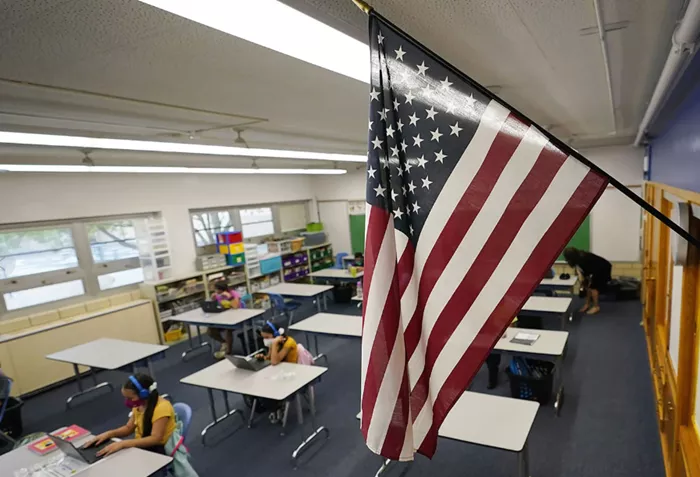When Donald Trump was last president, rumors about immigration raids spread through Oregon’s community, causing panic. Gustavo Balderas, the local school superintendent, recalled how rumors of immigration agents targeting schools led to widespread fear, with students hiding and avoiding school. Although there was no truth to the claims, school staff had to search for and reassure students who were too scared to attend.
As President-elect Trump prepares to take office again, educators are bracing for potential upheaval, regardless of whether his administration follows through on promises to deport millions of undocumented immigrants. Even if these threats are only discussed publicly, experts say the impact on children of immigrants is already being felt.
“You constantly threaten people with mass deportation, and it inhibits their ability to function in society,” said Hiroshi Motomura, a UCLA Law professor. “It affects children’s ability to get an education.”
For many children, that fear has already taken hold.
“They’re still coming to school, but they’re scared,” said Almudena Abeyta, superintendent of Chelsea Public Schools in Massachusetts. The district, a historic hub for Central American immigrants, now sees an influx of Haitian families as well. “They’re asking, ‘Are we going to be deported?’” Abeyta added.
Some parents, particularly those from countries where government control of schools is common, worry about their children’s safety and future in the U.S. In response to concerns, Abeyta sent a letter reassuring parents that their children would remain safe, no matter who is president.
Federal immigration agents have traditionally avoided arresting students or parents at schools, adhering to a policy that designates schools, hospitals, and places of worship as “sensitive locations.” This policy, first enacted in 2011 and updated in 2021 by U.S. Secretary of Homeland Security Alejandro Mayorkas, aims to avoid disruptions to essential services.
However, Trump’s proposed policy changes could disrupt this practice. His “Project 2025” roadmap suggests rescinding protections for these sensitive locations, a shift that could allow immigration enforcement closer to schools. Trump, despite distancing himself from these proposals during his campaign, has nominated many officials who worked on the plan, including Tom Homan for the position of “border czar.”
Such actions could lead to widespread panic, especially if immigration agents target schools. “If something happens at one school, it spreads like wildfire,” said Angelica Salas, executive director of the Coalition for Humane Immigrant Rights in Los Angeles. “Kids stop coming to school.”
Balderas, now superintendent in Beaverton, Oregon, said this month that his district is preparing for potential immigration raids. Staff will be trained to resist allowing immigration agents onto school grounds. “All bets are off with Trump,” said Balderas, who is also president of The School Superintendents Association (ASSA). “If something happens, it will happen a lot quicker than last time.”
Many school leaders are reluctant to speak publicly about their plans, fearing it could draw unwanted attention to immigrant students. One administrator, serving a district with a large Mexican and Central American immigrant population in the Midwest, said their school had invited immigration attorneys to help parents prepare for possible deportation. This administrator requested anonymity, citing concerns about speaking to the media.
In some cases, superintendents’ efforts to advocate for immigrant students may conflict with school boards, especially in conservative areas. Viridiana Carrizales, CEO of ImmSchools, a nonprofit that supports schools with immigrant student populations, has received multiple requests for help. “This is a delicate issue,” she said. Some superintendents are afraid that their school boards would not support public statements affirming immigrant students’ rights or pledging to block immigration agents.
Several school districts contacted by The Associated Press either declined to comment or chose not to respond. Denver Public Schools, for example, opted to remain neutral, with spokesperson Scott Pribble saying the district was monitoring the situation. “We continue to serve, support, and protect all of our students as we always have,” he said.
During Trump’s first term, Denver’s school board passed a resolution promising to protect students from immigration enforcement. The policy prohibits granting federal agents access to students unless they provide a valid search warrant. District leaders argue that fear of deportation undermines children’s ability to learn and violates their constitutional right to a free public education.
As schools across the country brace for the new administration, the question remains: will students be able to focus on their education, or will the fear of deportation overshadow their academic futures?
Related topics:
- ICE Considers Major Expansion of Immigrant Detention in New Jersey, Eyeing 600 New Beds
- Kenya’s Visitor Access Deteriorates Despite Promised Visa-Free Entry
- Immigrants’ Frustration with New Arrivals Fuels Trump’s Surge in Latino Support


